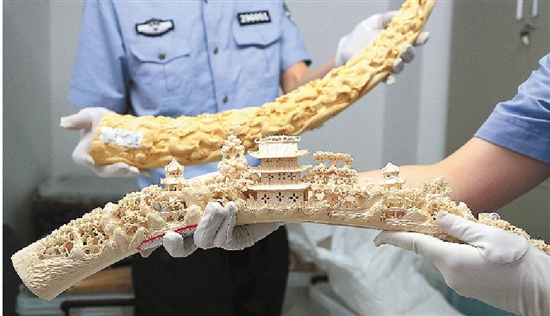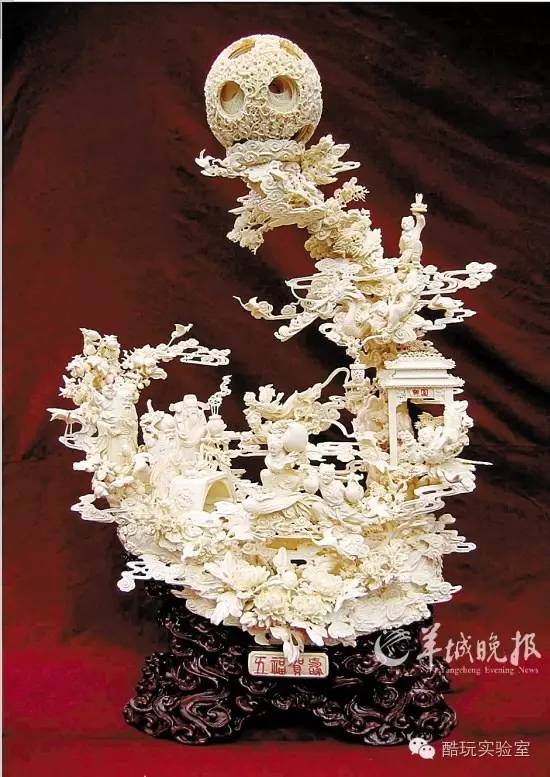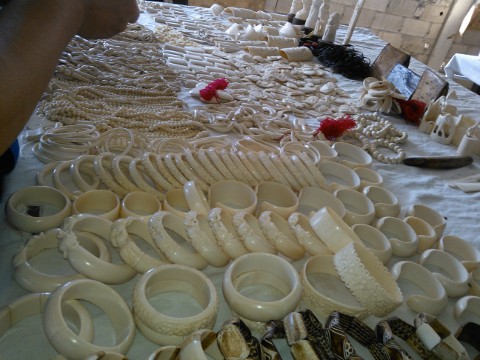


(Customs in Hangzhou demonstrate two smuggled ivory carving artpieces. Photo/Qianjiang Evening News)
In China, elephants have long been regarded as a symbol of happiness. The Chinese characters for “elephant” and “lucky” are both pronounced “xiang,” yet it’s hard to think of the animal as lucky when craftsmen continue to use their precious tusks for jewelry and other decorations.
The population of African elephants today is at a record low due to the ongoing popularity of ivory in China and other countries. Currently, there are fewer than 500,000 African elephants left in the wild, down from 1.2 million in 1981, according to TRAFFIC, a wildlife monitoring network under the World Wildlife Fund (WWF).
In response, China’s State Forestry Administration (SFA) has imposed a three-year ban on the import of nearly all ivory products, excepting those used for scientific study, public exhibition or law enforcement. The import ban will remain effective until Dec. 31, 2019.
While environmentalists have praised the decision and expressed hope for more restrictive orders in the future, some artists are looking for a way to preserve their traditional carving skills.
Old craftsmanship finds new paths
In 2006, China’s Ministry of Culture designated ivory carving as a national intangible cultural heritage. There are 34 officially designated ivory manufacturers in China, and they are estimated to be sitting on 40 tons of legal ivory, wrote Li Zhang, a professor at the College of Life Sciences of Beijing Normal University, in Nature magazine in November 2015.
The first year-long ban on ivory trade, issued by SFA in 2015, was received with support by some ivory carvers. According to Hangzhou-based ivory-carving master Ye Shenghua, the ban could help improve the artistic level of ivory carvings in China, as smuggled ivory carvings are mostly manufactured by machines, with relatively inexpert carving techniques.
“I hope there will be more national guidelines on ivory carving to help control the general demand, and also to create better conditions for the craft to be carried on,” Ye was quoted as saying by news site Zhejiang Online.
Others have begun to seek different ways to carry on the traditional skill. Zhang Minhui, a Guangzhou-based carver, has turned to bone carving, and especially ox bone carving. With his special method of skimming the fat on ox bones, Zhang’s factory can make ox bones as shiny as ivory tusks. He uses decorations to patch the cracks between ox bones during carving. In this way, Zhang’s bone carvings have gained a significant following and a subsequent 50 percent price hike, reported Southern Weekly.

(An artpiece of ivory carving Photo/Yangcheng Evening News)
Illegal ivory sales in disguise
There are 130 licensed dealers who sell tons of legal ivory to shoppers each year. Such licenses are renewed every two years, pending SFA review, and all will naturally expire after Dec. 31, 2016. In the mean time, large stockpiles of ivory products – even ivory products that are currently legal – may become troublesome, as they could lead to illegal ivory being passed off as legal.
A recent survey conducted by WWF and TRAFFIC pointed out that, of the 56 surveyed retail outlets certified to sell ivory products in China, 29 were found not to be abiding by the regulations set for certified dealers. These regulations include displaying certificate cards for ivory products and using the same measurement certificate for similar ivory products.
As each certificate includes the weight, size, type and photo of its associated ivory product, failing to display the certificates could easily facilitate the entry of illegal ivory into the legal market, warned the survey.
Another problem is that illegal ivory products can still be found in antiques and collectors’ markets, the survey indicated. At markets in five Chinese cities, including Beijing, Shanghai and Guangzhou, some 189 outlets were found to be selling a total of 1,519 illegal ivory products. Small items accounted for 97.2 percent of the total, and more than 80 percent of these were accessories such as bracelets, bangles, pendants and amulets. The average price has remained at 30 RMB per gram since 2011, TRAFFIC data showed.
On Sept. 26, two businessmen running an illegal ivory operation in Jiangsu province were sentenced to up to three months in prison. The two ran a jade store that was also selling ivory tablets and lockets worth up to 11,000 RMB, Yangtze Evening News reported.

(Photo/Baidu Tieba)
Invisible online trade
Beyond the certificate system, another method that China currently employs to prevent illegal ivory trade is public education, with many posters displayed in subways. The poster campaign depicts a dialogue between a mother elephant and her baby, who has just started to grow tusks.
A search of “tusk” on Chinese search engine Baidu now yields a notice at the top of the page saying: “Buying equals killing. Say no to ivory products.” In addition, e-commerce giant Taobao has removed all commodities related to “tusks.”
However, ivory trade on websites, and especially social networking sites, is still hard to detect and intercept, the TRAFFIC report noted, adding that hundreds of pieces of ivory are still being sold on the Internet.
An ivory trader on WeChat told People’s Daily Online that his ivory jewelry was made from African elephant tusks that entered southern China’s Guangxi Zhuang Autonomous Region via Vietnam. While the claim could not be confirmed, smuggled tusks and ivory products are no strangers to Chinese customs.
Members of an ivory-smuggling ring that was transporting tusks from Vietnam to Guangxi were recently sentenced to up to 18 months in prison.
At the same time, countries where much of the elephant poaching is taking place are also calling for international cooperation on a total ivory trade ban. The Kenyan government said on Sept. 25 that it will lobby for a total ban on ivory trade during the 17th meeting of parties at the Convention on International Trade of Endangered Species (CITES), which kicked off in South Africa on Sept. 24, the Xinhua News Agency reported.
State House spokesperson Manoah Esipisu said that international efforts are needed to deal with the illegal trade of ivory products.
"The trade is simple. Demand for illegal products drives supply,” Esipisu explained to journalists in Nairobi. “Dealing with the trade requires aggressive law enforcement, effective elephant ivory and rhino horn movement control and influential market disincentivization."
 Fire brigade in Shanghai holds group wedding
Fire brigade in Shanghai holds group wedding Tourists enjoy ice sculptures in Datan Town, north China
Tourists enjoy ice sculptures in Datan Town, north China Sunset scenery of Dayan Pagoda in Xi'an
Sunset scenery of Dayan Pagoda in Xi'an Tourists have fun at scenic spot in Nanlong Town, NW China
Tourists have fun at scenic spot in Nanlong Town, NW China Harbin attracts tourists by making best use of ice in winter
Harbin attracts tourists by making best use of ice in winter In pics: FIS Alpine Ski Women's World Cup Slalom
In pics: FIS Alpine Ski Women's World Cup Slalom Black-necked cranes rest at reservoir in Lhunzhub County, Lhasa
Black-necked cranes rest at reservoir in Lhunzhub County, Lhasa China's FAST telescope will be available to foreign scientists in April
China's FAST telescope will be available to foreign scientists in April "She power" plays indispensable role in poverty alleviation
"She power" plays indispensable role in poverty alleviation Top 10 world news events of People's Daily in 2020
Top 10 world news events of People's Daily in 2020 Top 10 China news events of People's Daily in 2020
Top 10 China news events of People's Daily in 2020 Top 10 media buzzwords of 2020
Top 10 media buzzwords of 2020 Year-ender:10 major tourism stories of 2020
Year-ender:10 major tourism stories of 2020 No interference in Venezuelan issues
No interference in Venezuelan issues
 Biz prepares for trade spat
Biz prepares for trade spat
 Broadcasting Continent
Broadcasting Continent Australia wins Chinese CEOs as US loses
Australia wins Chinese CEOs as US loses